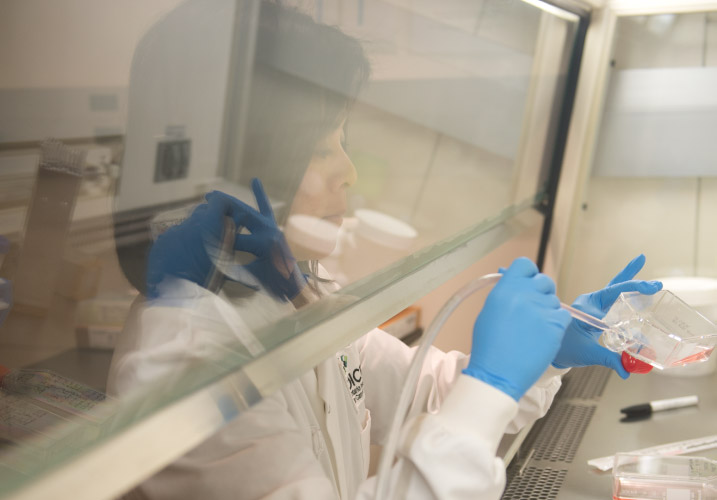Funding provides $16 million in support for Ontario cancer research
December 2, 2021—Toronto—Today the Ontario Institute for Cancer Research (OICR) announced funding for 16 studies as part of the Institute’s new Clinical Translation Pathway (CTP). These awards support pre-clinical research and new clinical trials that have a focus on early stage and recurrent cancers.
“Cancer is the leading cause of death in Ontario. Currently, nearly two in five people in the province will receive a diagnosis of cancer in their lifetime. One in four of those people are expected to die from the disease,” says Dr. Steven Gallinger, Head of Clinical Translation at OICR. “The Clinical Translation Pathway is a major new source of funding for Ontario’s cancer researchers that will support practice-changing research in biomarkers, diagnostics and therapeutics that will advance early detection and intervention research with a clear path to clinical impact.”
One of the newly funded studies is from Drs. Glenn Bauman (Lawson Health Research Institute, London, Ontario) and Andrew Loblaw (Sunnybrook Health Research Institute, Toronto, Ontario). They are co-leading a clinical study to validate “next generation” imaging techniques to find and track prostate cancer from diagnosis through treatment. By tracking imaging changes before and after treatments they will monitor whether patients are responding to radiation therapy.
“Optimizing the integration of advanced prostate imaging into the non-invasive treatment and monitoring of men with prostate cancer is a clear need,” says Dr. Bauman. “This funding supports a clinical study that provides access to state-of-the-art imaging for men with locally advanced prostate cancer and allows us to better understand how this image can help us design high dose precision radiotherapy treatments and evaluate the success of this treatment.”
Integral to the CTP program is the engagement of patients in the research process. OICR’s Patient and Family Advisory Committee reviewed and provided feedback to the applicants’ patient engagement plans, ensuring that the studies being supported had the potential for real-world impact.
“We are excited by the compelling and innovative cancer research proposals being funded by OICR,” says Antonia Palmer, Chair of OICR’s Patient and Family Advisory Council (PFAC). “The OICR PFAC felt inspired by all of the research proposals. It is rewarding to be able to bring the patient and caregiver perspective to the scientific review process and we are hopeful that these projects will be impactful for patients with cancer.”
By investing in research projects on a pathway towards clinical adoption, OICR supports studies that evolve from testing pre-clinical ideas to new potential therapies and new precision medicine tools for patients. Several of the studies announced today are moving forward after showing initial promise as part of the OICR Adaptive Oncology program, while others are studies advancing from the earlier funded Translational Research Initiatives.
“One of OICR’s goals is to fund work along the continuum of a cancer patient’s journey starting from initial diagnosis or early relapse after initial therapy. The new CTP is supporting the development of precision oncology tools to select the best therapies in order to more effectively intervene in the disease process earlier and prevent further disease progression towards a more uncontrollable situation,” says Dr. Laszlo Radvanyi, OICR’s President and Scientific Director. “The CTP is critical to accelerate the progression of research findings that show real potential to move into clinical trials and eventually into the health care system. The CTP also synergizes with OICR’s window-of-opportunity clinical trial network to develop the best precision medicine tools for our patients.”
“Ontario is proud to support OICR in creating a clear path from the clinic to real-world application for research that advances the early detection and intervention of cancer,” said Jill Dunlop, Minister of Colleges and Universities. “Thanks to OICR’s work, the impressive oncology discoveries and innovations from these 16 projects could lead to improved patient outcomes in the future — ensuring Ontarians with cancer have hope for a better future.”
The CTP is part of OICR’s Clinical Translation research theme, which supports the advancement of discoveries through early clinical validation, partnering with patients, industry and the health system for downstream development and implementation.
The other new funded researchers include:
- Dr. Jane Bayani – Ontario Institute for Cancer Research
- Dr. Tobias Berg – McMaster University
- Dr. Scott Bratman – University Health Network
- Dr. David Cescon – University Health Network
- Dr. Eric Chen – University Health Network
- Dr. John Dick – University Health Network
- Dr. Marc de Perrot – University Health Network
- Dr. Richard Kim – Lawson Health Research Institute
- Dr. Natasha Leighl – University Health Network
- Dr. Stephanie Lheureux – University Health Network
- Dr. Mitchell Sabloff – The Ottawa Hospital
- Dr. Ana Spreafico – University Health Network
- Dr. Martin Yaffe – Sunnybrook Research Institute
- Dr. Gang Zheng – University Health Network
A summary of each project is available now on the OICR website.
For more information or to book an interview, contact:
Christopher Needles
Director of Communications
416-319-5252
christopher.needles@oicr.on.ca

